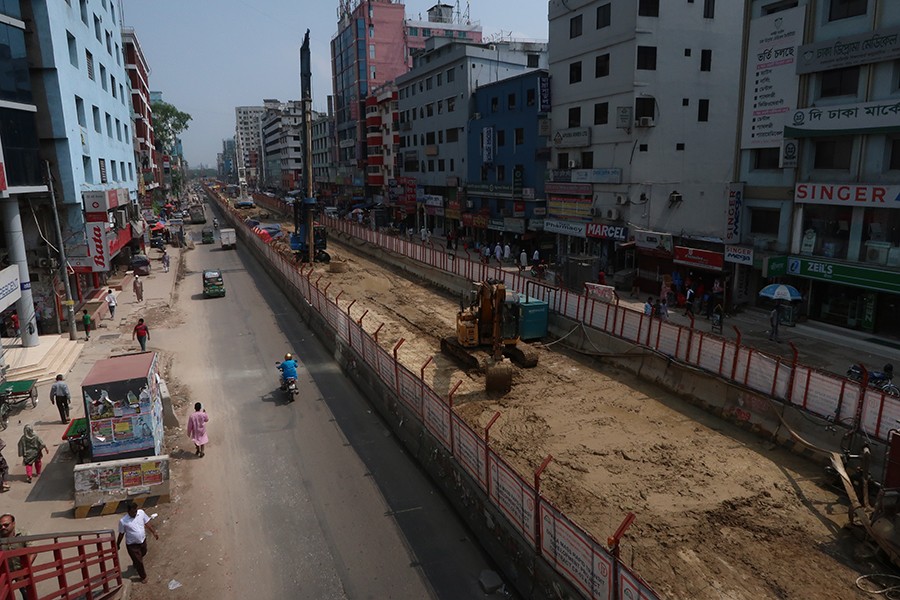
Published :
Updated :

Bangladesh should concentrate more on decentralised development, said Country Director of the Asian Development Bank (ADB) Manmohan Parkash in Dhaka Tuesday.
"Dhaka and Chittagong account for 60 to 70 percent of the country's Gross Domestic Product (GDP). Meanwhile, huge areas in the south-western and north-western parts remain impoverished."
"Studies show that US$ 160 billion can be added to the economy just by developing the south-western region. Opening of Padma Bridge will help to unleash that opportunity."
Mr Parkash was speaking at a meeting of the American Chamber of Commerce in Bangladesh (AmCham).
The ADB country head also called for leveraging the geographical advantage of Bangladesh through (getting involved with) more connectivity projects.
"Bangladesh is the gateway to India for the countries under Association of Southeast Asian Nations (ASEAN), gateway for the ASEAN countries to India, and at the same time, gateway to the south for China," he added.
Mr Parkash called for making more investment in quality infrastructure and regional connectivity.
"Five things are critical for Bangladesh right now. These are - continuity of macro-economic policies, good debt management, increased investment in infrastructure, human capital development, and good regional connectivity."
"We need to invest in quality infrastructure - infrastructure that will benefit the poorest of the poor," the ADB country director observed.
"Up until now, we have invested quite heavily in primary and secondary education. But what we realise now is that we need to invest in tertiary education and skill development. This is where the next level of jobs will be created."
Bangladesh urgently needs to lower its corporate tax rate to attract more foreign direct investment (FDI), business leaders said at the event.
At the same time, the central bank needs to play a more proactive role in addressing the existing problems in the financial sector, they opined.
"Our corporate tax rate is one of the highest in the world, and it is significantly higher than most of our neighbours," said former president of AmCham Aftab ul Islam.
"For example, the corporate tax rate is 20 per cent in Thailand, 17 per cent in Vietnam, and 22 per cent in Malaysia."
In Bangladesh, the tax rate is 25 per cent for listed entities and 35 per cent for non-listed entities.
"How can we hope to attract foreign investors with such a high tax rate?"
The AmCham former president also identified the country's complicated legal system and bureaucratic entanglement as other investment hurdles.
"None of the best taxpayers here has good relationship with the government. Either they have an issue with NBR, or with Ministry of Land or with Ministry of Law."
Mr. Aftab was also critical of the current scenario in the country's banking sector.
"The situation of the banks has become terribly bad. Meanwhile, almost all the government-owned banks are in red zone."
"As per Bangladesh Bank Order 1972, the absolute power of controlling the money market has been given to the central bank governor."
"But this is my personal opinion that Bangladesh Bank (BB) has become an extension of Ministry of Finance," noted Mr. Aftab, who is also a director the central bank.
He was also pessimistic about the bulging of non-performing loans in the banking sector.
"Rescheduling of huge loans is being done repeatedly, not by BB but by the government."
"Meanwhile, the highest authority of the central bank and its board remain inactive," he added.
Speakers at the event also called for more investment in research and innovation as well as for enhancing skill level of the country's human resources.
"The past was defined by advantage in terms of low-cost labour. But, the future comparative advantage will have to come in terms of knowledge and innovation," said Executive Chairman of Bangladesh Investment Development Authority (BIDA) Kazi M Aminul Islam.
"Next forty to fifty years will be very critical for us," said former finance secretary Dr. Mohammad Tarek.
"We have to equip our young generation with appropriate skills and knowledge to leverage our demographic dividend," he opined.
President of AmCham Md. Nurul Islam, and President of Federation of Bangladesh Chambers of Commerce an`d Industry (FBCCI) Md. Shafiul Islam (Mohiuddin) also spoke on the occasion.
mehdi.finexpress@gmail.com


 For all latest news, follow The Financial Express Google News channel.
For all latest news, follow The Financial Express Google News channel.